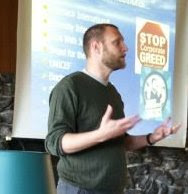May God Bless All People with Peace
Psalm 29
This psalm speaks of the power, violence even, of God. It seems to lift up the pairing of violence with glory, power-over with holy splendor. It reads at first like a advertisement for the latest artillery: thundering, flashing with flames of fire, shaking the wilderness, breaking the mighty cedars of Lebanon, causing oaks to whirl and forests to be stripped bare. It is almost frightening in its cadence and persistence. It is somewhat as if a ten-year old boy wrote down his fantasy god: lots of explosions and destruction; unbridled, unmatched and unrelenting power ripping through the world (naively not mentioning or considering the suffering all this might cause people or animals).
But for all that, the last word is peace. This song of power and destruction ends with the affirmation of peace. Whatever else God's word seems to be, the psalm seems to say, in the final analysis it is peace.
Reading through again, we might find a different theme rising up. The voice of God over the waters (v 3), like Genesis 1:2, is an ordering principle bringing order out of chaos, bringing formation out of unformed existence. Even when the Lord sits enthroned over the flood (v 10), the flood being an event of unmatched destruction and suffering, it was an act aimed at redemption and peace - a price too terrible to be paid again, as even God would afterwards admit.
The cedars of Lebanon, broken by God's voice, reveal that the strongest of powers - either physical strength like cedar beams (v 5) or political strength like Lebanon and Sirion (v 6) - crumble beneath God's word. God does not want us servile to political or psychological Powers any more than we would be servile to beams of strong wood. The psalm reminds us of the true power, true authority, the true source and object of our allegiance. And those places of wilderness (v 8) where we believe we are beyond God's work or word - there the timbre of God's voice can yet be felt.
And the Voice that causes the "oaks to whirl" (v 9) is also the voice that "causes the deer to calve" (alternate interpretation of verse 9). We oftentimes read into God's presence and activity that which we want to see, or that which we expect. Since leaders and kings and warriors are the ones whose stories are told over and over, we expect God to resemble these figures. But God's creative activity persists. Those who want a warrior god will have it regardless, but God's activity will all the while be working behind the scenes bringing forth new life.
And while through it all it may be difficult to discern the activity of God, the song ends in the confidence that God's word is peace.
This psalm speaks of the power, violence even, of God. It seems to lift up the pairing of violence with glory, power-over with holy splendor. It reads at first like a advertisement for the latest artillery: thundering, flashing with flames of fire, shaking the wilderness, breaking the mighty cedars of Lebanon, causing oaks to whirl and forests to be stripped bare. It is almost frightening in its cadence and persistence. It is somewhat as if a ten-year old boy wrote down his fantasy god: lots of explosions and destruction; unbridled, unmatched and unrelenting power ripping through the world (naively not mentioning or considering the suffering all this might cause people or animals).
But for all that, the last word is peace. This song of power and destruction ends with the affirmation of peace. Whatever else God's word seems to be, the psalm seems to say, in the final analysis it is peace.
Reading through again, we might find a different theme rising up. The voice of God over the waters (v 3), like Genesis 1:2, is an ordering principle bringing order out of chaos, bringing formation out of unformed existence. Even when the Lord sits enthroned over the flood (v 10), the flood being an event of unmatched destruction and suffering, it was an act aimed at redemption and peace - a price too terrible to be paid again, as even God would afterwards admit.
The cedars of Lebanon, broken by God's voice, reveal that the strongest of powers - either physical strength like cedar beams (v 5) or political strength like Lebanon and Sirion (v 6) - crumble beneath God's word. God does not want us servile to political or psychological Powers any more than we would be servile to beams of strong wood. The psalm reminds us of the true power, true authority, the true source and object of our allegiance. And those places of wilderness (v 8) where we believe we are beyond God's work or word - there the timbre of God's voice can yet be felt.
And the Voice that causes the "oaks to whirl" (v 9) is also the voice that "causes the deer to calve" (alternate interpretation of verse 9). We oftentimes read into God's presence and activity that which we want to see, or that which we expect. Since leaders and kings and warriors are the ones whose stories are told over and over, we expect God to resemble these figures. But God's creative activity persists. Those who want a warrior god will have it regardless, but God's activity will all the while be working behind the scenes bringing forth new life.
And while through it all it may be difficult to discern the activity of God, the song ends in the confidence that God's word is peace.



0 Comments:
Post a Comment
<< Home